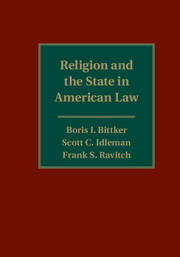Book contents
- Frontmatter
- Dedication
- Contents
- Preface
- 1 History and Introduction
- 2 Church and State in the Nineteenth Century
- 3 Religious Influences and Expressions in Law and Government
- 4 The Establishment Clause
- 5 The Free Exercise Clause
- 6 The Religious Test, Equal Protection, and Free Speech Clauses
- 7 The Definition of Religion
- 8 Church Property Disputes and Church Schisms
- 9 Contracts
- 10 Taxation
- 11 Employment
- 12 Land Use
- 13 Torts
- 14 Criminal Law and Process
- 15 Family Law
- 16 Public Education
- 17 Religious Symbolism on Government Property
- 18 Special Contexts: Prisons and the Military
- Appendix A Federal Constitutional Provisions
- Appendix B State Constitutional Provisions
- Appendix C Selected Federal Statutes 910
- Index
14 - Criminal Law and Process
Published online by Cambridge University Press: 05 October 2015
- Frontmatter
- Dedication
- Contents
- Preface
- 1 History and Introduction
- 2 Church and State in the Nineteenth Century
- 3 Religious Influences and Expressions in Law and Government
- 4 The Establishment Clause
- 5 The Free Exercise Clause
- 6 The Religious Test, Equal Protection, and Free Speech Clauses
- 7 The Definition of Religion
- 8 Church Property Disputes and Church Schisms
- 9 Contracts
- 10 Taxation
- 11 Employment
- 12 Land Use
- 13 Torts
- 14 Criminal Law and Process
- 15 Family Law
- 16 Public Education
- 17 Religious Symbolism on Government Property
- 18 Special Contexts: Prisons and the Military
- Appendix A Federal Constitutional Provisions
- Appendix B State Constitutional Provisions
- Appendix C Selected Federal Statutes 910
- Index
Summary
Introduction
“[T]he power to create and enforce a criminal code” is, in the U.S. Supreme Court's words, “[f]oremost among the prerogatives of sovereignty.” It enables a sovereign to proscribe or prescribe conduct in furtherance of community health, safety, welfare, or morals and then to prosecute violations of those mandates using the full complement of the state's coercive powers. To be sure, although governmental pervasiveness in the last century has perhaps blurred the line between regulation and criminalization, the latter nevertheless remains, conceptually at least, the paradigmatic expression of state authority.
As a practical matter, it is often the nature, extent, and basis of the punishment that distinguish criminal offenses from civil wrongs. Both transgressions, for example, can lead to minor or temporary incursions on liberty and, especially in the civil realm, to the confiscation of one's property. But criminal offenses also can lead to greater stigma, to significant secondary consequences (e.g., disenfranchisement), to more severe restrictions on one's basic liberties (e.g., incarceration), and even to the termination of one's life (e.g., capital punishment), which substantially explains the heightened evidentiary burden on the prosecution. Moreover, although both criminal punishment and civil liability are traditionally thought to have compensatory and deterrent functions, the former, unlike the latter, is often said to have incapacitative, rehabilitative, and retributive functions as well.
It is precisely the significance of the criminal legal system, as the fullest and most drastic expression of legitimate state authority, that often makes the relationship between this system and the religious realm historically rich, contemporarily important, and frequently controversial. This relationship can be approached and examined in a variety of ways. Broadly viewed, one might examine the historical or empirical correlations between religion and a sovereign's criminal jurisprudence or between religion and the prevention or occurrence of crime. One might also examine the potential complementarity between religion and the criminal law in the regulation of harmful conduct, or one might critique the criminal law from a particular religious perspective.
In this chapter, this relationship for the most part is presented topically. The overarching issue of the criminal law's application to religiously inspired conduct will first be examined both in general and with a specific focus on categories of crimes, from serious bodily harm to relatively minor offenses, as well as offenses against public morality or oneself.
- Type
- Chapter
- Information
- Religion and the State in American Law , pp. 634 - 702Publisher: Cambridge University PressPrint publication year: 2015



